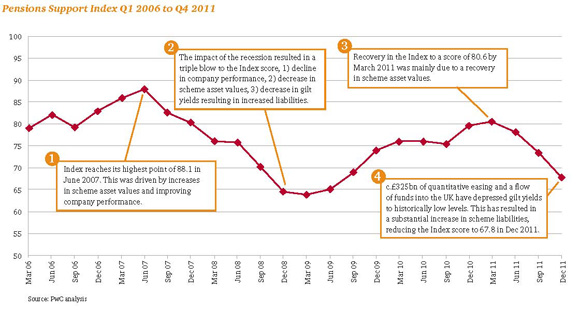A third of FTSE 350 faces spiralling debt
A new measure of FTSE 350 companies’ ability to pay off pension debts highlights how up to a third are at threat of insolvency.
A PwC index reveals the true situation for UK businesses by analysing their pension deficits alongside their overall assets and financial health.
The Pensions Support Index shows the number of companies most in trouble is at its worst since steep market falls in 2008, with many facing deficits spiralling to unaffordable levels.
In particular, the consultancy favours exploring the use of contingent assets, liability management exercises and buyout mechanisms.
According to PwC, the companies identified as low scoring must focus resources on deficit reduction, otherwise they risk insolvency or being pushed into the Pension Protection Fund.
But earlier this year, PW reported an emerging trend whereby banks are increasingly writing refinancing loans that forbid weak sponsors from funnelling money into burgeoning pension deficits in order to shrink them. This will leave some firms in a catch-22 dilemma.
It could be up to 20 years before businesses are back on track, because recovery periods have been stretched out so far
Jonathon Land, partner at PwC, said he expects a spate of insolvencies of household-name companies, while he predicted those with relatively large pension deficits could well lose their place in the FTSE 350 as a direct result.
“It could be up to 20 years before businesses are back on track, because recovery periods have been stretched out so far,” he warned.
And Paul McGlone, actuary at Aon Hewitt, said the problem is generational, as it doesn’t apply to companies that have been set up in the past decade. “Recently established start-ups don’t have this problem to contend with because they don’t offer defined benefit pensions to their staff – and never have done.
"But older companies, such as the likes of British Airways and BT, are crippled by the pensions promises they have made to their staff over the years.”
He added: “Gilt yields are to blame – reductions of 9 per cent over the past decade swap any change in life expectancy and the effects of legislation.”
Most Viewed
- What does Labour have in store for the pensions industry?
- LGPS latest: GLIL backers invest £475m for UK infrastructure push
- Dashboard costs rose by 23% in 2023, figures show
- Border to Coast launches UK strategy in major private markets push
- How the pensions industry can better support people with mental health problems


